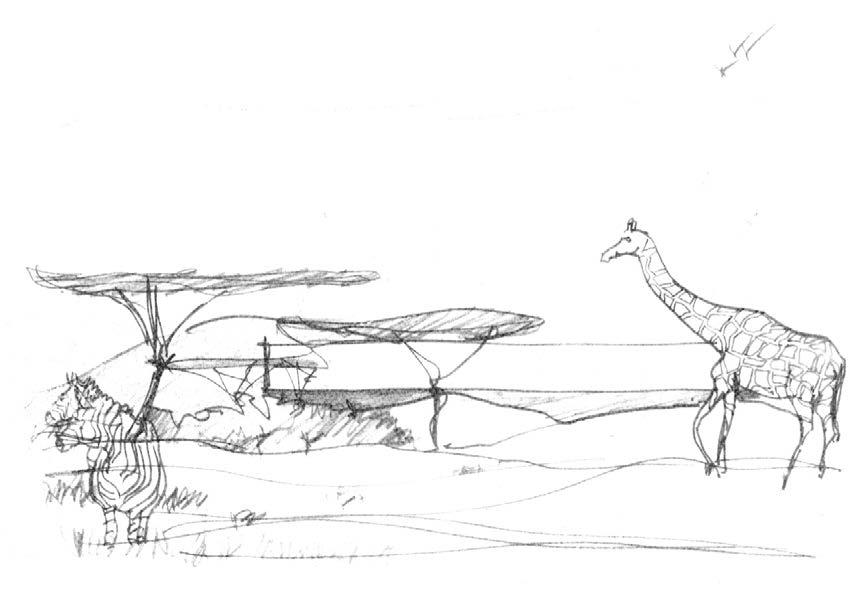
2 minute read
PANTANAL
CERCA DE DUAS DEZENAS DE ESPÉCIES HABITAM NO PANTANAL DO BARK. É A ZONA DO BRASIL MENOS
REPRESENTADA EM PARQUES ZOOLÓGICOS, PORQUE SE DÁ PREFERÊNCIA À AMAZÓNIA, SENDO QUE O PANTANAL ESTÁ MAIS AMEAÇADO.
Advertisement
EXTREMAMENTE LUXURIANTE, O PANTANAL ESTÁ AMEAÇADO PELA INTENSIVA EXPLORAÇÃO DE GADO. A EXTINÇÃO DE ANIMAIS NO BRASIL É SOBRETUDO POR CAUSA DA DESTRUIÇÃO DE HABITAT.
ABOUT TWO DOZEN SPECIES LIVE IN THE BARK PANTANAL. IT IS THE AREA OF BRAZIL LESS REPRESENTED IN ZOOLOGICAL PARKS, AS MOST PREFER TO USE THE AMAZON, BUT THE PANTANAL IS MORE UNDER THREAT. EXTREMELY FERTILE, THE PANTANAL IS THREATENED BY THE INTENSIVE EXPLOITATION OF CATTLE. THE EXTINCTION OF ANIMALS IN BRAZIL IS MAINLY BECAUSE OF THE DESTRUCTION OF HABITAT.
PAPA-FORMIGAS-GIGANTE
Myrmecophaga tridactyla VU
Só existe em parte da América Central, mais abundante na América Central. Insectívoro, come térmitas, formigas e larvas. A sua cauda é tão comprida como o resto do corpo, que utiliza para se cobrir quando dorme. É da ordem Xenatra onde também se incluem as Preguiças e os Tatus.
Giant Anteater
Myrmecophaga tridactyla
LC DD
It is only found in part of Central America and, more abundant in South America. An insectivore, it eat termites, ants and larvae. Its tail is as long as the rest of the body, which it uses to cover itself when sleeping. It is of the order Xenanthra that also includes Sloths and Tatus.
LOBO-DE-CRINA
Chrysocyon brachyurus
LC ON
O maior canídeo da América do Sul tem um metro de altura. A dieta baseia-se em pequenos roedores e invertebrados. É o típico animal que se pode encontrar no Cerrado, mas apesar disso é relativamente gentil. É um animal frágil. Em termos de linhagem está sozinho na família dos canídeos.
HORSE-WOLF
Chrysocyon brachyurus
LC ON
The largest canid in South America is one meter tall. It’s diet is based on small rodents and invertebrates. It is a typical animal that of the Cerrado, but despite this it is relatively gentle. It is a fragile animal. In terms of lineage it is alone in the canine family.
JAGUAR
Panthera onca
LC
JAGUAR
Panthera onca
FD
Predador de topo da América do Sul, é o terceiro maior felino do mundo. Também tem membranas interdigitais. O Pantanal é a zona com maior diversidade de Jaguares.
Top predator of South America, it is the third largest cat in the world. It also has interdigital membranes. The Pantanal is the area with the greatest diversity of Jaguars.
CAPIVARA

Hydrochoerus hydrochaeris
LC DD
É o maior roedor do mundo. Pode chegar a pesar 66 quilos. Está perfeitamente adaptado à vida aquática, com as suas membranas interdigitais. Apesar de gigantes, conseguem saltar até dois metros. Habituam-se bastante bem às pessoas.
MICO-LEÃO-DE-CABEÇA-DOURADA
Leontopithecus chrysomelas
DD
CAPYBARA
Hydrochoerus hydrochaeris
LC DD
It is the largest rodent in the world. It can weigh up to 66 kilos. It is perfectly adapted to aquatic life, with its interdigital membranes. Although giants, they can jump up to two meters. They get used to people quite easily.
GOLDEN-CROWNED LION MOTH
Leontopithecus chrysomelas
EN
É o primata que consta na nota brasileira de 20 Reais. Estariam extintos se não fossem os Zoos.
The primate that appears on the Brazilian 20 Reais banknote. They would be extinct if it were not for Zoos.










